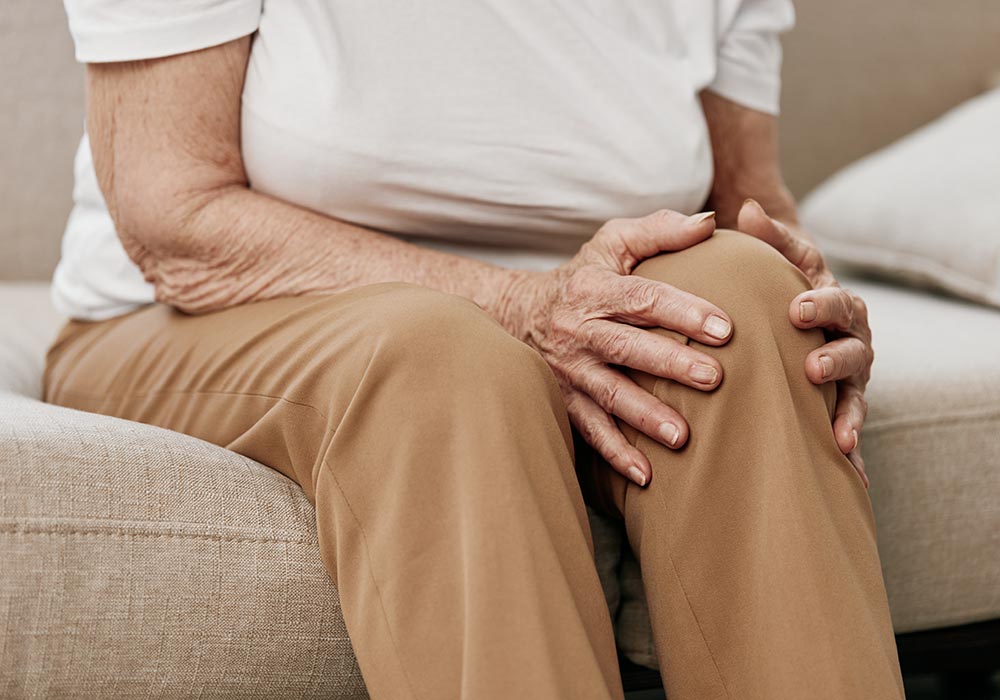The World Health Organization (WHO) reports that osteoporosis is one of the ten most common diseases worldwide. Therefore, it can be called a widespread disease. 80 percent of those affected are women. They often fall ill after menopause. The culprit is falling estrogen levels, which can have a negative effect on bone metabolism. How you can cope with the diagnosis and what osteoporosis treatment can look like is explained below.

What is osteoporosis?
The bones of the skeleton consist of a matrix that gives them shape and stability, as well as various minerals such as calcium that are stored in them. This keeps them dense and stable.
In order to adapt to changing conditions, a constant process of building up, breaking down and remodeling takes place in the bones. Build-up and breakdown are normally in balance, but can shift in one direction or the other depending on need.
If, for example, the body needs more stable bones during growth or when it is subjected to increased stress through sport, the building processes predominate. In the absence of stress, on the other hand, the body breaks down bone mass. This happens, for example, in patients who are bedridden for long periods. Even in the case of a general calcium deficiency (e.g. due to an unbalanced diet), the breakdown processes can predominate in order to release calcium from the bone substance. In addition, other factors such as hormonal changes or certain medications may promote bone resorption and/or inhibit bone formation.
If bone mass falls below a certain level, osteoporosis may develop.
What are the symptoms of osteoporosis?
- Pain, e.g. in the back, legs and knees
- Bone fractures as a result of inconspicuous injuries
- Loss of height
- Altered posture due to deformed spine (colloquially known as “widow’s hump”)
Osteoporosis treatment in our practice in Frankfurt
Basically, osteoporosis treatment is about slowing bone loss, increasing bone mass and reducing the risk of fractures. The specific treatment depends on various factors, including the severity of the disease, the individual risk of bone fractures, and general health.
In addition to careful diagnostics (DXA measurement/Dual Energy X-ray Absorptiometry) and detailed consultation in our private practice for orthopedics and traumatology in Frankfurt, we offer osteoporosis treatment tailored to your individual needs. This usually consists of several components.
Medical therapy
We have various medications available to treat your osteoporosis (e.g. bisphosphonates, selective estrogen receptor modulators, denosumab, teriparatide, abaloparatide). This medication works either by inhibiting bone resorption or by stimulating bone formation. We can also incorporate nutritional supplements such as calcium and vitamin D supplements into treatment.
Lifestyle changes
Healthy lifestyle habits can help reduce bone loss and promote bone health. These include a balanced diet with adequate calcium and vitamin D, regular physical activity, and avoiding risk factors such as smoking and excessive alcohol consumption.
Fall prevention
Since falls are a common risk for fractures in osteoporosis, fall prevention is also an important part of therapy. We recommend optimizing the living situation, removing tripping hazards, improving lighting and using aids such as handrails. In addition, it is immensely important to strengthen the musculature and balance through targeted exercises (keywords: medical training therapy, physiotherapy).
Osteoporosis treatment Frankfurt
The treatment of osteoporosis is usually long-term and requires close cooperation between you and us. We always adapt the therapy to your individual needs and risk factors. Regular check-ups and monitoring of your bone health are also important to assess the course of therapy and make adjustments if necessary. We are here for you in our practice in Frankfurt!
Image sources: 602441468 © SHOTPRIME STUDIO | stock.adobe.com